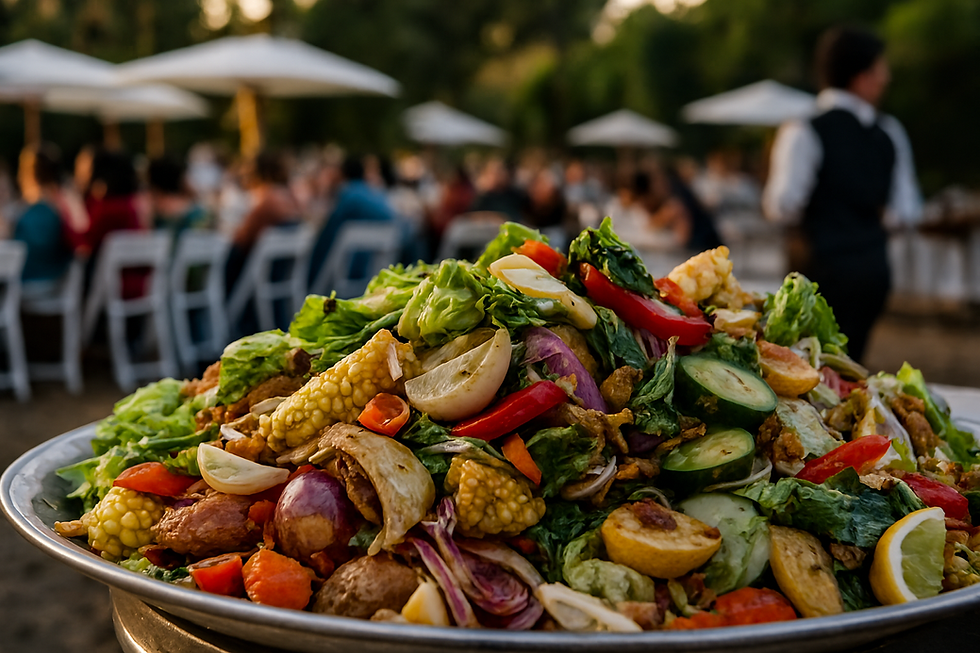Hurricane Season Planning: Building Resilient Eco-Events in the Caribbean
- Avion W. Anderson
- Jun 15
- 3 min read
The Caribbean is no stranger to the natural beauty of turquoise waters, tropical forests, and sun-drenched beaches—but it's also no stranger to the powerful winds and rains of hurricane season.
For event professionals and eco-conscious brands hosting sustainable events in this region, planning during this time of year requires not only creativity but resilience and foresight.
Eco-events—those that prioritize environmental responsibility, community engagement, and minimal ecological impact—must be doubly prepared when scheduled during hurricane season (typically June to November).

By adopting proactive strategies, embracing flexibility, and embedding sustainability at every level, event organizers can create resilient eco-events that withstand the storm, both literally and figuratively.
1.) - Start with Climate-Aware Planning
A resilient eco-event begins with climate literacy. Understand the patterns and historical trends of hurricane activity in your region. Work closely with local meteorologists, tourism boards, or disaster preparedness agencies to access real-time insights and predictions.
Avoid scheduling large-scale outdoor events at the height of storm season. Instead, aim for early or late in the season, when the risk may be lower—or consider hybrid or virtual formats that reduce physical vulnerabilities altogether.
2.) - Choose Resilient, Sustainable Venues
When selecting a venue, prioritize:
Storm-hardened infrastructure: Eco-lodges or community centers with hurricane-resistant features (e.g., reinforced roofs, water drainage systems).
Backup energy solutions: Solar-powered backup systems or off-grid capabilities that align with green principles.
Sustainable design: Buildings with passive cooling, natural lighting, and rainwater harvesting support both eco-goals and emergency preparedness.
In the Caribbean, partnering with venues that practice both sustainability and resilience—like eco-resorts or marine conservation centers—can significantly reduce risks.
3.) - Create a Sustainable Emergency Plan
Preparedness is key. Your eco-event should include:
A green emergency kit: Reusable flashlights, compostable dishware, biodegradable waste bags, solar chargers.
Digital over paper: Ensure all communications—schedules, maps, and emergency protocols—are mobile-friendly and accessible online to minimize paper waste and increase flexibility.
Evacuation and shelter strategy: Align with local emergency services and ensure guests know where to go and what to do in case of an evacuation.
Remember, eco-consciousness doesn’t end when the wind picks up—it continues in how you manage crisis responsibly and ethically.
4.) - Source Local, Low-Impact Materials
When you’re facing logistical disruptions from a tropical storm or hurricane warning, local sourcing becomes your lifeline.
Minimize the need for cross-border shipping by working with local artisans, chefs, and eco-vendors. This not only supports the local economy but reduces the carbon footprint and ensures faster, adaptable responses to supply chain disruptions.
Also, use durable and reusable materials—bamboo signage, upcycled décor, compostable containers—that won’t become environmental hazards in high winds or floods.
5.) - Design with Flexibility and Adaptability
The most successful eco-event designs in hurricane season are those that can be fluid:
Tent and structure flexibility: Opt for modular tents or canopies that can be quickly dismantled or secured.
Digital backup plans: Build a contingency hybrid or virtual experience so the event can go on if travel becomes impossible.
Rolling timelines: Consider a “rain date” or an extended activation plan so you can pivot and re-engage guests post-storm.
6.) - Insure with Conscious Coverage
It’s not glamorous, but comprehensive event insurance with hurricane or weather disruption clauses is essential. Choose policies that align with your values—some eco-insurers now offer green coverage options that prioritize recovery with sustainable rebuilding.
7.) - Communicate Transparently with Stakeholders
Building trust with your attendees, sponsors, vendors, and team is vital during hurricane season. Be transparent about your storm-season strategy and how you will ensure safety and sustainability at every step.
Pre-event materials should include:
- Weather disclaimers
- Emergency contact information
- Eco-conscious recovery commitments in the event of disruption

Final Thoughts: Resilience is the Heart of Sustainability
Hosting eco-conscious events in the Caribbean during hurricane season is a challenge—but also an opportunity to model climate resilience in action. It’s about showing the world that sustainability isn’t just for fair weather. It’s for every storm.
By embedding preparation, flexibility, and local collaboration into your event design, you don’t just create a greener experience—you build a stronger, smarter, more responsible future for events in the Caribbean.



Comments